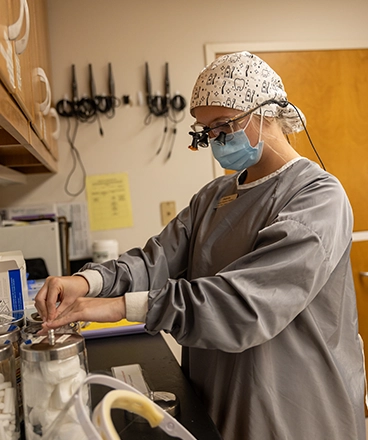The Dental Hygiene program at CVCC has exceeded my expectations. The instructors are so supportive, and the hands-on experience in the clinic has truly prepared me to care for patients with confidence and compassion.
Dental Hygiene
Are you passionate about promoting health and helping others achieve their best smiles? If you’re ready to make a difference in oral health, CVCC’s Dental Hygiene program will give you the tools to succeed.
When you study Dental Hygiene at CVCC, you’ll develop the knowledge and expertise to assess, plan, implement, and evaluate dental care for individuals and communities. Students gain practical experience preparing the operatory, taking patient histories, noting abnormalities, planning care, teaching oral hygiene techniques, cleaning teeth, taking x-rays, applying preventive agents, completing chart entries, and more.
Graduates of the program may be eligible to take national and state or regional examinations for licensure, an essential step to practicing dental hygiene. With this credential, you’ll unlock career opportunities in dental offices, clinics, schools, public health agencies, professional education, and beyond.
For information on our Dental Assisting and Community Dental Healthcare Coordinator programs, please visit the Heath Continuing Education gage.
Contacts
Nikki Hicks, Department Head, Dental Hygiene Program
Dental Hygiene
828-327-7000 ext. 4631
Program Information
Please see the catalog for more information about the degree option in this curriculum.
For more information please see the application packet for criteria and procedures for selection, curricular content, estimated program costs, and course transferability.
2026 Dental Hygiene Admission Packet
Dental Hygiene MAR Checklist Form
Specific deadlines are set for each entering class. Please refer to the current Dental Hygiene Admission Packet for the admission deadline date for the next Dental Hygiene class. Admission to the Dental Hygiene Program is competitive. There is no waiting list.
Upcoming Information Sessions
September Informational Session (9/8/2025)
October Informational Session (10/6/2025)
November Information Session (11/3/2025)
The dental hygiene program at Catawba Valley Community College is accredited by the Commission on Dental Accreditation (CODA) of the American Dental Association, a specialized accrediting agency recognized by the U.S. Department of Education.
A dental hygienist in North Carolina is licensed to provide preventive oral health services such as teeth cleanings, oral health education, preliminary oral assessments, application of preventive agents, and taking x-rays, typically under the supervision of a licensed dentist. Qualified hygienists are able to perform screenings and cleanings in certain public health settings—like schools and elder-care facilities—without a dentist physically present, provided specific experience and training requirements are met. Additionally, North Carolina dental hygienists who are properly certified may administer local anesthesia by infiltration and block techniques.
Program Goals and Core Competencies
Goal 1: Prepare students to practice their selected profession skillfully, intelligently, ethically, and safely within their legal stated bounds.
Core Competencies:
1.1 Utilize critical thinking skills to implement the dental hygiene process of care.
1.2 Apply a professional code of ethics in all endeavors
1.3 Utilize methods that ensure the health and safety of the patient and the oral
health professional in the delivery of care
1.4 Adhere to state and federal laws, recommendations, and regulations that govern
the profession
Measures of Assessment:
- Clinical Evaluation Form
- Clinical Competencies
- Graduate Surveys
- Employer Surveys
- Feedback from Advisory Committee
- Patient Satisfaction Surveys
Goal 2: Prepare students to practice in a variety of settings with a diverse population.
Core Competencies:
2.1 Communicate effectively serving all persons without discrimination
2.2 Respect the goals, values, beliefs, and preferences of all patients
2.3 Provide care using an individualized approach tailored to the patient’s needs.
2.4 Provide care in alternative practice settings
Measures of Assessment:
- Clinical Evaluation Form
- Clinical Competencies
- External Site Rotation Reports
Goal 3: Establish the significance of lifelong professional growth and development.
Core Competencies:
3.1 Use evidence-based decision making to evaluate emerging technology and
treatment modalities
3.2 Self-assess to evaluate treatment outcomes
3.3 Access professional and social networks for continuing education opportunities
and to pursue professional goals.
Measures of Assessment:
- Product Evaluation Project
- New Technology Reviews
- Research Article Reviews
- Clinical Self-Assessment Forms
- Participation as Student Members of ADHA
- Professional Development/Community Service Points
Goal 4: Encourage and support faculty development
Core Competencies:
4.1 Provide for continuing education opportunities
4.2 Encourage involvement in professional organizations
4.3 Encourage higher educational achievement in order to improve classroom and
clinical instruction.
Measure of Assessment: None needed
Request Information
Ready to take the next step? Whether you’re just starting out or planning a visit, we’re here to help you begin your journey.

